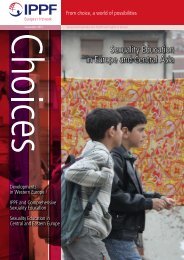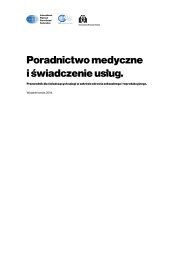Annual Report - IPPF - International Planned Parenthood Federation
Annual Report - IPPF - International Planned Parenthood Federation
Annual Report - IPPF - International Planned Parenthood Federation
You also want an ePaper? Increase the reach of your titles
YUMPU automatically turns print PDFs into web optimized ePapers that Google loves.
<strong>IPPF</strong> EN <strong>Annual</strong> <strong>Report</strong> 2011 Highlights UNITE | 7<br />
A global movement fighting for sexual rights and reproductive rights for all<br />
What makes <strong>IPPF</strong> unique is that it is<br />
a <strong>Federation</strong> of independent grass<br />
roots civil society organisations<br />
around which women and men<br />
voluntarily organize themselves to<br />
respond to their local needs. As<br />
an international nongovernmental<br />
organisation promoting human<br />
rights, social justice, democracy and<br />
sustainability, <strong>IPPF</strong> offers support to<br />
improve the sexual and reproductive<br />
health of populations as well as the<br />
tools to build up a strong civil society<br />
that has the potential to express<br />
their views and hold governments<br />
accountable for their promises and<br />
commitments.<br />
Today, <strong>IPPF</strong> European Network (EN) is<br />
highly respected by a number of key<br />
European partners and stakeholders<br />
for its level of expertise and its holistic<br />
approach to a broad spectrum of issues<br />
linked to sexuality.<br />
The <strong>IPPF</strong> EN Regional Office (ENRO)<br />
continues to play a strong role in<br />
building the capacity of Member<br />
Associations to participate in both<br />
domestic and international advocacy<br />
efforts. This includes working with<br />
strategic partners and other civil<br />
society organisations (CSOs), international<br />
organisations and parliamentarians<br />
to ensure the respect of<br />
sexual rights and reproductive rights<br />
for all.<br />
The wealth of knowledge and the<br />
diversity of experience of the 40<br />
Member Associations that make up<br />
the <strong>IPPF</strong> European Network provide<br />
a solid base for learning, sharing and<br />
coordinating action.<br />
Increasing Civil<br />
society Participation<br />
and Government<br />
Accountability<br />
Since 2008, the <strong>IPPF</strong> Regional Offices<br />
of Europe and Western Hemisphere<br />
Region (WHR) have teamed<br />
up with Member Associations in 11<br />
countries in Latin America, Eastern<br />
Europe and Central Asia to increase<br />
the transparency and accountability<br />
of governments in regard to their<br />
promises to ensure universal access<br />
to reproductive health by 2015 1 .<br />
Funded by DFID (UK Aid), the<br />
“Joining Forces for Voice and Accountability”<br />
is a fiveyear initiative<br />
focused on improving the ability of<br />
<strong>IPPF</strong> Member Associations to play<br />
a proactive role with other CSOs<br />
in influencing public policy around<br />
Sexual and Reproductive Health and<br />
Rights (SRHR).<br />
In 2011, The Regional Office provided<br />
Member Associations with<br />
training in advocacy, monitoring<br />
and evaluation and coalition building<br />
following the political mapping<br />
that took place in 2010, as a first<br />
step, to enable Associations to assess<br />
the political situation in their<br />
respective countries.<br />
As a result of this and earlier<br />
capacity building efforts under the<br />
project, the Member Associations<br />
of Albania, Bosnia & Herzegovina,<br />
Moldova, Kazakhstan, Kyrgyzstan<br />
and Tajikistan now lead SRHRfocused<br />
networks in their countries<br />
and represent civil society in key<br />
bodies or governmental coordination<br />
mechanisms to provide input<br />
on various aspects of government<br />
transparency and accountability,<br />
including government funding of<br />
SRHR programmes.<br />
Addressing the unmet<br />
need for family planning<br />
in development<br />
cooperation<br />
The <strong>IPPF</strong> EN Regional Office continued<br />
to fulfill its role as lead<br />
partner of ‘Countdown 2015 Europe’,<br />
a Consortium made up of 16<br />
SRHR organisations, including 10<br />
<strong>IPPF</strong> Member Associations, with<br />
strong track records of successful<br />
advocacy on the national level and<br />
with the European institutions.<br />
The group aims to increase European<br />
donor support for reproductive<br />
health and family planning in<br />
development cooperation through<br />
both policies and funding.<br />
Since the end of 2010, the Countdown<br />
2015 Europe has placed specific<br />
focus on reducing the unmet<br />
need for family planning as an essential<br />
component of sustainable<br />
development. In this new and exciting<br />
phase, the Consortium worked<br />
in partnership with CSOs from the<br />
global South, combining evidence<br />
and experience from around the<br />
globe to formulate advocacy arguments<br />
for increased EU support to<br />
family planning. This resulted in the<br />
development of an advocacy toolkit<br />
including fact sheets and testimonies<br />
to build the case for family<br />
planning. The toolkit explores the<br />
linkages between family planning<br />
and some of the most pressing issues<br />
faced in current international<br />
discussions such as population<br />
dynamics, the environmental and<br />
climate change challenges, the<br />
economic crisis and the decline in<br />
funding for sexual and reproductive<br />
health services. It also illustrates<br />
how family planning programmes<br />
have a strong and central role to<br />
play in other development issues,<br />
“successful advocacy can happen when<br />
there is a team that is able to resist the opposition,<br />
that has a single purpose and the understanding<br />
and belief that you can change<br />
the quality of life for many people in your<br />
country, especially young people’s health.”<br />
Galina Chirkina, RHAK Executive Director, Kyrgyzstan<br />
1 2015 is the date set out in the United Nations Millennium Declaration for reaching the Millennium Development Goals (MDGs), in particular, MDG5 to ‘improve maternal health’ with targets 5A: Reduce by three quarters, between 1990 and 2015, the maternal mortality ratio and target<br />
5B: Achieve, by 2015, universal access to reproductive health.





